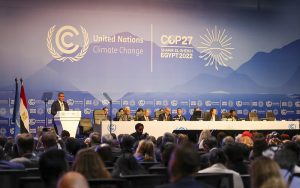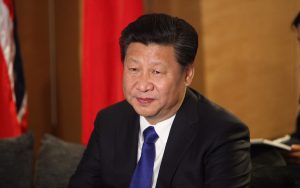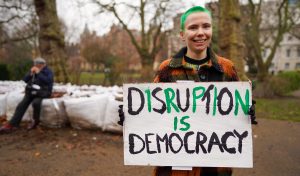We stand for human rights, and if you don’t like them… well, we have others. (Groucho Marx paraphrase)
Morality in politics has long been a subject of numerous debates. It is impossible to simply state whether it exists or not but as we elaborate on this matter, it is pivotal that we ruminate on the behavior of states and other actors on the international stage considering the complex relationships between them as well as their underlying interests. Hans Morgenthau contends that political realism does not require, nor does it condone, indifference to political ideals and moral principles, but it requires indeed a sharp distinction between the desirable and the possible- between what is desirable everywhere and at all times and what is possible under the concrete circumstances of time and place. (Morgenthau and Thompson, p. 113, 1948).
In light of these thoughts, it is not surprising that US President Joe Biden’s Summit for Democracy has been castigated because of the two-faced nature many saw behind it. The aim of this summit was, in its essence, to make it clear that the USA plans on setting the tone for strengthening democracies around the world in the midst of impending threats for human rights and basic democratic principles.
China and Russia were not invited to the summit and this initiative reaffirms the strong opposition between the USA and the above-mentioned states. Having taken into consideration the ongoing economic and geostrategic rivalry between these actors, it is reasonable to mention that the purpose of the summit is far from being one-sided. However, one can easily acknowledge the Wilsonian thought, which has been a solid endeavor for lots of American administrations one way or another. In his legendary work ‘Diplomacy’ Henry Kissinger highlights the fact that for Woodrow Wilson the justification of America’s international role was messianic: America had an obligation, not to the balance of power, but to spread its principles throughout the world. During the Wilson Administration, America emerged as a key player in world affairs, proclaiming principles which, while reflecting the truisms of American thought, nonetheless marked a revolutionary departure for diplomats of the “Old World”. These principles held that peace depends on the spread of democracy, that states should be judged by the same criteria as individuals, and that the national interest consists of adhering to a universal system of law (Kissinger, 1994, p.26). Interestingly, at the very end of his book, he remarks: ‘The Wilsonian goals of America’s past – peace, stability, progress, and freedom for mankind – will have to be sought in a journey that has no end. “Traveler, „says a Spanish proverb, “there are no roads. Roads are made by walking.”’ (Kissinger, 1994, p. 835).
Truthfully, from a purely philosophical perspective, one can contemplate the meaningfulness of walking this road. After a detailed examination of international relations in the course of history, one may be inclined to be considerably pessimistic about the much-craved establishment of fundamental principles, which shall be respected under all circumstances and hold that such a position is the reducito ad absurdum of idealistic approaches. Nevertheless, the wisdom, which the Spanish proverb carries, consists in building the non-existent road even though one will never see it finished. Just as in life one may never find answers to one’s countless existential questions, but it is the delight that one takes in searching and exploring that creates actual meaning, so when it comes to various causes concerning certain policies, some efforts might not be in vain after all. More often than not, the outcome is not satisfying enough but passivity has proved itself to be detrimental on so many occasions.
In the meantime, while the USA kindly invites government officials to the so-called Summit for Democracy, it clearly supports Israel’s apartheid regime, as it was recently called by Amnesty International, in the occupied Palestinian territories and is endlessly tolerant of the policies of ethnical cleansing and illegal settlement as well as the occupation of Palestinian land in breach of international law.
The 9th of December 2021 marks 34 years since the first Palestinian Intifada (meaning uprising). The Intifada was an explosion of frustrated energy waiting to happen after 20 years of Israeli military occupation and repression, and the repeated failure of diplomatic and political efforts to improve the Palestinians’ conditions or move towards statehood. (O’Ballance, 1998 p.45). These violent policies are still raging and innumerable reports from different human rights organizations are beyond disturbing. A report of Al Menza for Human Rights, an independent, non-partisan, non-governmental human rights organization, considers the following violations of international law through the prism of the Apartheid Convention: use of excessive force and recurrent military targeting of civilians and civilian homes, killing thousands; arbitrary arrest and detention of children, patients, fishermen, and other vulnerable groups; and the sustained closure and blockade. Al Mezan concludes that these practices amount to “inhuman acts” as defined by the Apartheid Convention, including murder, infliction of mental and bodily harm, arbitrary arrest and illegal
imprisonment, imposition of living conditions calculated to cause the physical destruction of the population as a whole or in part, and the denial of the right to freedom of movement and to leave and return. These inhuman acts are perpetrated by the State of Israel for the purpose of establishing and maintaining domination by one racial group—Israeli Jews—against another racial group—Palestinians (Al Menza, p.4).
Based on the analysis presented, which is drawn from and develops existing relevant work by Palestinian, Israeli, and international human rights organizations, academics, and experts, this report concludes by reaffirming that Israel’s institutionalized and systemic racial domination and oppression of the Palestinian people, including those residing in the Gaza Strip, contravenes Article 3 of the International Convention on the Elimination of All Forms of Racial Discrimination, amounts to the crime of apartheid per the Apartheid Convention, and constitutes a crime against humanity under the Rome Statute of the International Criminal Court. (Al Menza, 2021, p.5)
As one examines the blatant violations of human rights in Palestine, waving around the democracy principles flag in other corners of the globe seems, to say the least, duplicitous. The problems that we encounter question the point of vying for human rights respect since it seems that, if they are not on the agenda of the most powerful states, they may turn out to be a lost cause. Rights and principles are often addressed when concrete national interests are affected but because of national interests, or due to a particular conception of national interests, states are willing to remain silent or even whitewash international crimes.
All in all, is there anything that could be done and does the international community possess the needed instruments to deal with such systemic crimes?
The answer to this question is ambiguous. The truth is that the UN framework and the UN Charter in particular allow certain measures to be taken. Furthermore, governments, corporate actors, human rights defenders, supranational organizations and multiple governmental and non-governmental organizations can consistently work for pressuring Israel to abolish its discriminatory policies and put an end to this regime and flagrant violations of fundamental human rights. There is a boycott, divestment and sanctions movement taking place and internationally trading businesses may consider halting their relationships with Israeli companies and organizations related to the maintenance of the military occupation and linked international law encroachments. Another tremendous issue, which is worth pondering, is the one that concerns media propaganda. Unfortunately, some people can easily be led to believe that the oppressed is actually the oppressor. The easiest way to control people’s behavior is to make them believe what you want them to believe and if they become strongly convinced that they have formed their own personal opinion, then you have done your job right. This is why we need critical thinkers, doubters, individuals who are hungry for the truth and know how to eschew being manipulated. There are not enough groups of organized citizens who are eager to pressure their own governments to take action whatsoever. The reason for this are mainly the following two: increasing apathy and disinformation. As George Orwell writes in his remarkable novel ‘1984’: ‘Until they become conscious, they will never rebel…’ (Orwell, 2003, p. 81).
Human rights may remain captive to harsh approaches in international policy, but it is not always the case. Those who can sometimes make a difference are we, the people. Ordinary citizens, when united and organized, can put pressure on their governments through demonstrations, sending letters to the relevant institutions and raising awareness. Businesses, which export goods and services have the right to decide whether they should trade with certain countries such as Israel, and more specifically, with countries whose undertakings are in any way linked with human rights violations. Artists can refuse to perform and there are not a few of them who do this. A famous example is Roger Waters. The UN can impose specific sanctions and so can the EU. Admittedly, it is hard to take decisions unanimously and that is why there doesn’t seem to be much progress in this direction but it is highly important that countries activate their diplomatic mechanisms. After all, the stability of the region is of everyone’s interest and this issue can only be resolved by getting to the root of the problem. Assuredly, some powerful tools, which are needed in the battle against human rights violations include proper education, solidarity, trying to eradicate prejudices and encouraging strong societal engagement. Besides indifference, which can totally blow every attempt for some action, biases are probably one of humanity’s worst enemies. Not by chance did Albert Einstein once say that ‘it is harder to crack prejudice than an atom.’ However, doing away with prejudices can have a significant impact on the activity of particular citizens, organizations and businesses. Frankly speaking, as we look around, it might seem that lots of efforts that are put in turn out to be futile. However, it would be a lie to claim that there are not many true warriors for human rights who put their hearts and souls into the fight for freedom and justice. It is namely these people who are capable of leaving a footprint in history and it is their fire that ignites other souls.
To finish off with offering some food for thought, it is interesting to look at what Victor Frankl gets at when he talks about ideals: ‘If somebody insists that the eternal human values have always and everywhere been abused and have been turned into a means to achieving political, commercial, erotic and other aims or have been used to serve somebody’s personal vanity, we can respond to them that all of this only proves the universal necessity and the everlasting power of these values because the very fact that something must wear a moral attire in order to be effective, eventually proves that morality itself is effective and active, i.e., it has the ability to influence a person through their own morality.’ (Frankl, 2000, p.79)
Sources Al Mezan Center For Human Rights, ‘The Gaza Bantustan. Israeli Apartheid in the Gaza Strip’, pdf. Available at: http://mezan.org/en/uploads/files/16381763051929.pdf , Accessed: 22 December 2021 Amnesty International (2022): Israel’s apartheid against Palestinians: a cruel system of domination and a crime against humanity, https://www.amnesty.org/en/latest/news/2022/02/israels-apartheid-against-palestinians-a-cruel-system-of-domination-and-a-crime-against-humanity/, Amnesty International, Accessed: 18 February 2022 Frankl, V., (2000), The Doctor and the Soul, 3rd edn, Sofia: Lege Artis, translated from Bulgarian by Stella Popova Kissinger, H.(1994), Diplomacy, 1st edn, pdf, Available at: pdf (ysu.am), Accessed: 22 December 2021 Morgenthau and Thompson, (2017), The Nature of the International System, pdf. Available at: A Realist Theory of InPolitics.pdf, Accessed: 22 December 2021 O’Ballance, E. (1998), The Palestinian Intifada, 1st edn, pdf, Available at: file:///C:/Users/user/AppData/Local/Temp/The%20Palestinian%20Intifada%20by%20Edgar%20O%E2%80%99Ballance%20(auth.)%20(z-lib.org).pdf, Accessed: 22 December 2021 Orwell, G., (2003), 1984, 1st edn, Great Britain: The Penguin Group








Be First to Comment